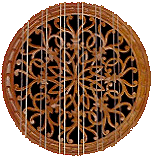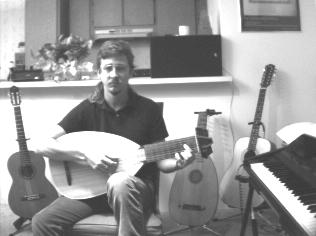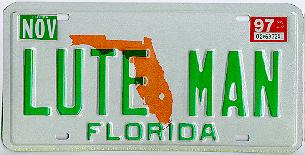



This is a picture of me with some of my instruments. From left to right are a classical guitar, an Aria eight-course lute, a Scherzer seven-course lute, a twelve-string guitar, and a Kurzweil K1000 SE II.
I also own -- and play -- several recorders, alto saxophone, Celtic harp, a tabor pipe, and various and sundry other things that I bought primarily for amusement value (doumbeks, a bagpipe chanter, harmonicas and a "Jew's harp"). I also own a violin, but if I try to play it, my cat hides for about three days.
My interest in Renaissance music began in high school, when I joined the madrigal ensemble. It was such a positive experience that, after high school, I majored for three and a half years in music education at Central Connecticut State University (at the time, they didn't offer a degree in music performance). I eventually switched my major to computer science, but continued my interest in music.
During one summer in high school, I became involved in a production of the musical Grease, and was given a role which required me to learn how to play four chords on a guitar. I enjoyed that immensely, and purchased a guitar and continued to teach myself how to play it.
Some time later, my friends gave me a lute for a Christmas present. For a few years, I "faked it" by tuning the lute to the same intervals as a guitar; however, I eventually discovered Thomas Robinson's The Schoole of Musicke, and Robert Dowland's A Varietie of Lute-Lessons (two lute self-instruction books from the first decade of the seventeenth century) at a local university library, and began teaching myself the proper way of playing a lute.
In high school and college, I sang bass, but often lamented that the more interesting solos (and better roles in operas/musicals) generally seemed to go to the tenors. So I started attempting to extend my range upwards and eventually (after about six years) was singing tenor in the Master Chorale of Tampa Bay, an audition-only chorus which regularly performs with The Florida Orchestra.
I am currently a member of a Tampa-based early music ensemble, the Calais Consort. Composed of a mix of period and modern instruments, we perform a capella, instrumental and mixed pieces, and I keep busy as the group's arranger.

I purchased my second lute (the Aria) for three reasons: it was inexpensive, it had gut frets (a previous owner of my Scherzer had installed metal frets, which really chews the hell out of silver-wrapped silk bass strings), and it came with a hardshell case that doesn't take up the entire back seat of my car.
Shown above is my auto tag. I've always wanted a "vanity plate", so once my friends had talked me out of trying to get a plate like "NET GEEK", the choice was obvious.
One of my current hobbies is transcribing English music of the sixteenth and seventeenth centuries into modern notation (and MIDI files). Much of it contains a beauty and complexity which is often lacking in the music of the twentieth century. While I enjoy Baroque music, I prefer the Renaissance's emphasis on melodic voicings over the motif-based compositions of the later era.
The carved soundhole rose at the top of this page is from my Scherzer lute, as is the background wood graphic.
|
Lute-related Links |
|
| La Bella home page | This is where I buy my lute strings. The prices are excellent, and although they normally sell only to music stores, they will sell lute strings to individuals. |
| Arto Wikla's Music Page | Arto Wikla possesses many lutes that are worth drooling over, and his music page contains very good information about lute technique. He also has a lot of excellent links, some of which I have stolen for this list. |
| Guitar & Lute page | Allan Alexander's page; contains links to free music, MIDI, and other things. |
| The Guitar and Lute Music Page | Stanley I. Drasky's collection of music scores. |
| Lute Page for Guitarists | Conrad Leviston's page. Includes a treatise on reading German lute tablature, as well as some pieces in regular tab. |
| The Lute Society of America | No, wait, I used to know what this link was to... :-) |
| Dartmouth Lute FTP Site | This site contains, among other things, ASCII transcriptions of lute tablature. |
| (More links to come...) | |
| Zubal Auction Co. | The Zubal company has a number of out-of-print books dealing with the subject of music. I called them looking for a copy of The Roxburghe Ballads; they kept looking until they had found a first-edition set at a very reasonable price. |